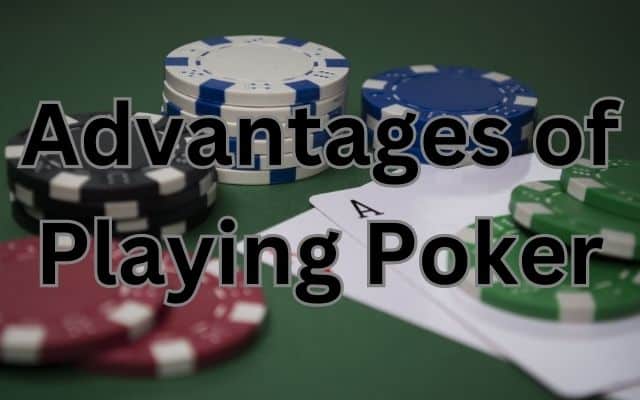Advantages of Playing Poker: From Mental Engagement to Financial Gain

One of the advantages of playing poker is that it enhances critical thinking skills and strategic decision-making abilities. Engaging in poker is a highly popular card game that attracts a diverse range of individuals from various age groups and backgrounds. While some individuals view Poker as a source of amusement or recreational pursuit, others approach it as a competitive game requiring skill and strategic thinking. Irrespective of the motivations behind playing, poker offers numerous advantages that extend beyond the sheer exhilaration of the game. This article aims to explore some of the benefits associated with playing poker. The subsequent points outline these advantages:
Advantages of Playing Poker
Mental engagement
Participating in poker offers a mentally stimulating experience that encompasses multiple facets. In addition to considering your cards and playing style, you must closely observe and analyze your opponents’ behaviors and tendencies to make wise decisions. This involves attentively studying their facial expressions, body language, and betting patterns to gain insights into their potential card holdings.
Furthermore, playing poker requires the ability to recall past hands and outcomes to make informed choices. This necessitates having a strong memory and the capacity to quickly and accurately recollect pertinent information. Additionally, poker players must make swift decisions based on incomplete information, which can pose a mental challenge.
Playing poker demands a high level of mental stimulation, which has the potential to enhance cognitive function. For instance, it can improve problem-solving skills by necessitating creative and critical thinking to develop effective strategies. Moreover, it can enhance decision-making abilities as players must analyze available information and make informed choices based on their analysis.
Socializing
Engaging in poker provides a wonderful avenue for meeting new individuals and fostering social connections with like-minded enthusiasts. Whether participating in a casino setting or a casual home game, you’ll have the chance to interact with a diverse range of individuals hailing from various backgrounds and cultures.
Stress reduction
Participating in poker can serve as a valuable means of reducing stress and unwinding after a demanding week or day. Due to the game’s requirement for focus and concentration, it can serve as a distraction from any stress or worries you may be experiencing. Moreover, achieving success in a poker game can generate a sense of fulfillment and positively impact your emotional well-being.
Financial gain
Poker is a game that highly values skill and strategic thinking, and individuals who invest time in learning and honing their abilities are often able to reap the rewards. While becoming a professional poker player is a challenging endeavor achieved by only a select few, playing poker can serve as a profitable hobby or an additional source of income for many.
The game is commonly played in casinos or online platforms, offering a wide range of tournaments and cash games with varying buy-ins and prize pools. For those who possess skill and discipline, poker can provide an avenue to supplement their earnings or even sustain a livelihood. To generate income from playing poker, it is crucial to possess a comprehensive understanding of the game’s rules and strategies. This necessitates analyzing different playing approaches and resources and observing expert players through videos.
Enhanced self-discipline
Engaging in the game of poker demands a considerable amount of self-discipline, particularly when it comes to effectively managing one’s bankroll and emotions. Players must cultivate the ability to handle their financial resources responsibly, ensuring they allocate and utilize their funds wisely. This entails avoiding impulsive decisions driven by fleeting emotional impulses that may lead to financial recklessness.
The practice of self-discipline in poker extends beyond financial management. It also involves regulating one’s emotions and reactions throughout the game. As players experience highs and lows, it is essential to remain composed and make rational decisions rather than being swayed by momentary frustrations or elations. Developing this emotional self-control can have profound effects on various aspects of life outside of the poker table.
Enhanced patience
In poker, exercising patience with Poker Cards involves resisting the temptation to make impulsive moves or react hastily to the actions of opponents. Instead, it entails calmly assessing the current state of the game, analyzing the available information, and strategically biding your time until the circumstances are most favorable for success. This deliberate approach allows you to make more informed decisions based on a thoughtful evaluation of the situation at hand.
The ability to cultivate patience in poker is particularly advantageous in situations where the stakes are high and quick decisions are required. By practicing patience, you learn to maintain a composed mindset, avoiding impulsive actions that could lead to unfavorable outcomes. This skill can be immensely valuable in real-life scenarios that demand clear-headedness and the capacity to navigate tense or challenging circumstances.
Fosters strategic thinking
Poker is not merely a game of chance; it is a strategic pursuit that demands players to make calculated decisions based on careful analysis of probabilities and potential outcomes. Regular engagement in poker can significantly enhance your strategic thinking and decision-making abilities, transcending the boundaries of the game and proving beneficial in various facets of life.
In poker, strategic thinking involves assessing the current situation, evaluating the strength of your hand relative to those of your opponents, and anticipating future moves. It requires you to consider the probabilities of different outcomes based on the available information and adjust your strategy accordingly. By consistently engaging in poker, you develop a keen sense of strategic thinking, honing your ability to analyze complex situations and make well-informed choices.
Enhances emotional management
Poker is a game that often involves high-pressure situations, and players must exhibit emotional control to make rational choices. Engaging in the game teaches individuals to effectively manage their emotions and remain composed when facing pressure, a skill that can be advantageous in real-life scenarios too.
Teaches financial management
Engaging in poker entails making bets and effectively managing your bankroll, which can contribute to the cultivation of skills in money management and budgeting.
- Everything You Need to Know About Poker
- Best Online Poker Tools Which Will Help You To Win Game
- What Type of Poker Player Are You? Understanding the 6 Different Styles
Conclusion
Participating in poker provides numerous benefits that extend beyond mere entertainment. It can enhance cognitive abilities, improve financial prospects, and positively impact various areas of life. Regardless of skill level, poker is a game that can be enjoyed by individuals at any stage, from beginners to experienced players.






